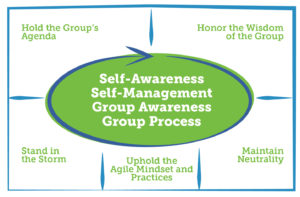On May 20, 2021 I was a guest speaker at the Business Agility Meetup – Twin Cities edition.
This BAM presentation is part of a series of interviews and conversations I am having about facilitation with the agile community and people in leadership. As the author of ‘The Art & Science of Facilitation’, I am essentially on my second Book Tour!
Join me as I revisit this conversation about dialogue. Make sure to read to the end and watch the full video!
Conversations are Elusive
Effective conversations are elusive. We think we are communicating effectively only to find out that we didn’t.
Instead, we end up in the same conversation over and over again aka a groundhog conversation. People nod politely as if in agreement and then go tell their colleague what they really think after the meeting. Or, there are so many ideas on the table that we lose focus and none of them get adequately completed.
No individual, group or organization is immune to these patterns in conversation.
Conversations: Effectiveness and Breakdowns
It’s not if conversations will become ineffective or lead to breakdowns, it’s when, how often and how leaders are able to respond in the moment when it happens that makes the difference.
Leaders Hold the Key to… More Agility
Leadership is a conversation. And leaders who can create the conditions – facilitate – effective conversations will hold the key to higher performance, greater alignment, and more agility.
In their Harvard Business Review article, ‘Embracing Agile’, authors Rigby, Sutherland and Takeuchi wrote
“Agile has revolutionized the software industry…Now it is poised to transform nearly every other function in the industry. At this point, the greatest impediment is not the need for better methodologies, empirical evidence or significant benefits, or proof that agile can work outside IT. It is the behavior of executives.”
Leading Through Conversation
In the video below, I explored with the attendees of Business Agility Meetup what it means to lead through conversation. We discussed the following:
- Understanding the importance of reading the room and why it’s everyone’s job
- Learning a language for reading the room and how to model it for others
- Gaining strategies for how to start facilitating conversations more effectively today
I don’t want to give it all away right here – head on over to the YouTube video to listen to this invigorating conversation!
Watch the Full Video: Leadership is a Conversation
Ready To Learn More About (Virtual) Facilitation
We thought you might be!
This summer, get more knowledge about facilitation by participating in the next Virtual Facilitation Masterclass: “Leading Engaging and Productive Virtual Collaboration”
We’ll show you the common mistakes that keep remote teams from realizing true agility.
Then, you’ll learn practical solutions to plan and design virtual meetings so you can:
- Facilitate genuine connection and trust among remote team members
- Turn virtual meetings into effective, efficient decision-making tools
- Engage your team’s creative power regardless of zip code
- Motivate your remote team members to perform to their capabilities with ease
- Build a truly collaborative team that gets results

